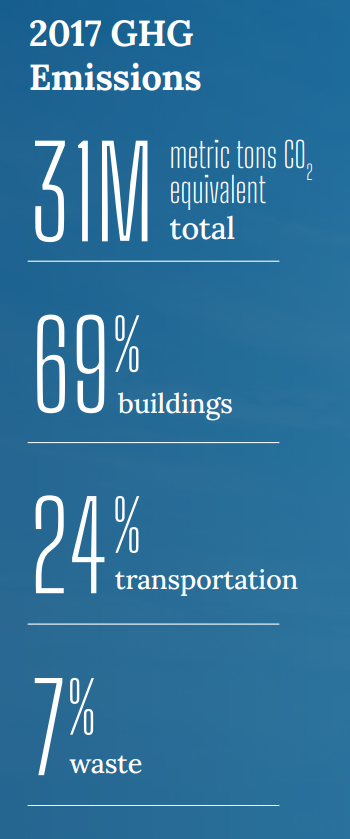Electrify Chicago
An independent tool for viewing City of Chicago building data
According to the
2022 Chicago Climate Action Plan,
69% of Chicago's emissions come from buildings, making
building emissions our biggest challenge and our biggest opportunity as a city
to tackle climate change. At Electrify Chicago, we showcase building performance using
publicly available data supplemented by community-submitted photographs and building
owners.
Start by looking at Chicago's buildings with the highest greenhouse gas intensity i.e. emissions per square foot. Large, efficient, buildings can perform much better than very inefficient small buildings on this metric.
New Article
📰 $30 Million In Missed Fines
The City Of Chicago failed to collect $30 million in potential fines from the building benchmarking ordinance, reducing transparency and accountability.
Legislative update! 🎉
As of late January 2024, legislation is being introduced to require new use more efficient forms of water and space heating, via the Clean And Affordable Buildings Ordinance (CABO), which will reduce the number of highly polluting and inefficient buildings that end up on this site.
If you're in Chicago,
write to your alderman to support the CABO!
Chicago Buildings by Greenhouse Gas Intensity
Note: Data includes large Chicago buildings with data from 2022, unless explicitly stated otherwise.
Note: This data only includes buildings whose emissions are reported
under the
Chicago Energy Benchmarking Ordinance. According to the City “As of 2016,
this list includes all commercial, institutional, and residential buildings larger than
50,000 square feet.” This dataset is also then filtered to only buildings with
reported emissions > 1,000 metric tons CO2 equivalent.
The latest year of data is from 2022, but we update the site regularly when new data is available, and some buildings may have failed to report that year, and only have older data available.
| Property Name / address | Primary Property Type |
Greenhouse Gas Intensity (kg CO2 eq./sqft) |
Total Greenhouse Emissions (metric tons CO2 eq.) |
|---|---|---|---|
|
353 N Clark St
🚩
353 N Clark St
| Office | 9.2 kg/sqft
Highest 18%
| 12,553 tons #45 Highest
|
|
Willis Tower
🚨
📷
233 S Wacker Dr
| Office | 9.2 kg/sqft
Highest 18%
| 41,767 tons #6 Highest
|
|
Olive-Harvey College
🕰️
10001 S Woodlawn Ave
| College/University | 9.2 kg/sqft | 3,641 tons |
|
Lawson Partners
🕰️
30 W Chicago
| Multifamily Housing | 9.2 kg/sqft | 2,394 tons |
|
The Park at Wrigley
1101 W WAVELAND AVE
| Office | 9.1 kg/sqft
Highest 18%
| 2,254 tons
Highest 20%
|
|
Union Lofts Condominium Association
🕰️
3500 S Sangamon
| Multifamily Housing | 9.1 kg/sqft | 728 tons |
|
2500 N Lakeview Ave
2500 N Lakeview Ave
| Multifamily Housing | 9.1 kg/sqft
Highest 18%
| 1,897 tons
Highest 24%
|
|
Eastwood Garden Limited Partnership
🕰️
6531 S. LOWE
| Multifamily Housing | 9.1 kg/sqft | 1,608 tons |
|
916 S Wabash Ave
916 S Wabash Ave
| College/University | 9.1 kg/sqft
Highest 18%
| 605 tons
Lowest 34%
|
|
Westinghouse HS -CPS
(CPS)
3301 W Franklin Blvd
| K-12 School | 9.1 kg/sqft
Highest 18%
| 2,049 tons
Highest 22%
|
|
Raby HS -CPS
🕰️
(CPS)
3545 W Fulton St
| K-12 School | 9.1 kg/sqft | 1,416 tons |
|
Hampton Fine & Performing Arts -CPS
(CPS)
3434 W 77th St
| K-12 School | 9.1 kg/sqft
Highest 18%
| 896 tons
Highest 49%
|
|
Andrew Jackson Language Academy - CPS
(CPS)
1340 W Harrison St
| K-12 School | 9.1 kg/sqft
Highest 18%
| 673 tons
Lowest 39%
|
|
Greeley Elementary -CPS
(CPS)
832 W Sheridan Rd
| K-12 School | 9.1 kg/sqft
Highest 18%
| 555 tons
Lowest 31%
|
|
CDOT Central Office
🕰️
(Chicago)
1501 W Pershing Rd
| Office | 9.1 kg/sqft | 907 tons |
Data Source:
Chicago Energy Benchmarking Data
